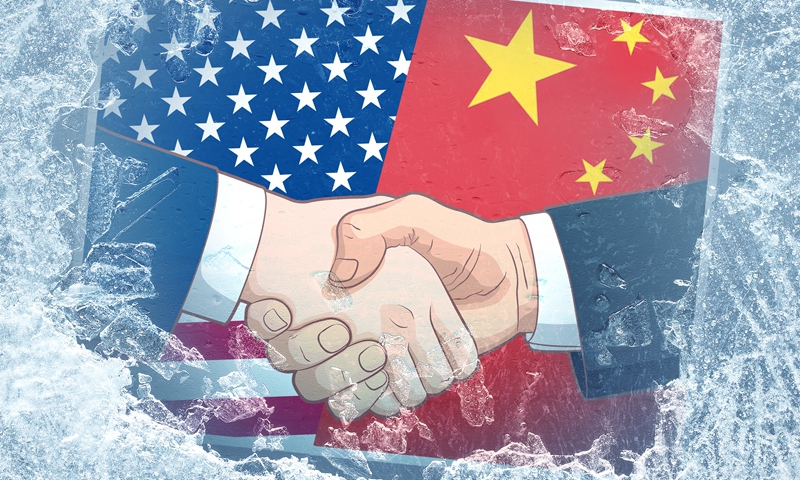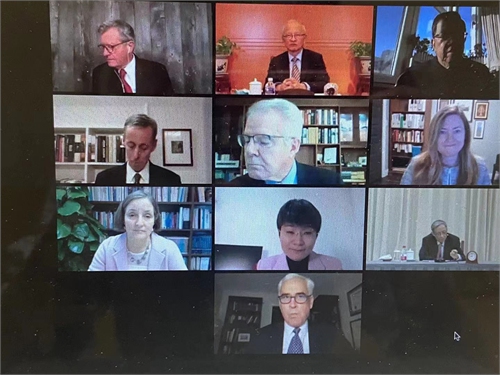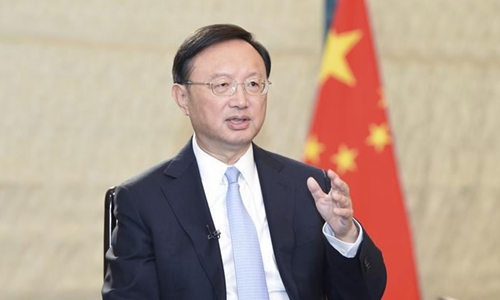China to send 'friendly message but draw bottom line' to US via senior diplomat's speech
US doomed if Biden adopts Trump's China policy: expert

China US
Senior Chinese diplomats including a vice foreign minister and ambassador to the US have been sending a message of cooperation to the US in recent days, and on Tuesday morning (Beijing time), a highly anticipated speech will be delivered by senior Chinese diplomat Yang Jiechi to a US audience, and Chinese experts said China will deliver its sincerity for cooperation but will also draw clear bottom lines.
To what extent US President Joe Biden can correct the problematic China policy made by the Trump administration will not just decide the future of China-US relations, but will also determine if the US would recover from the current mess or keep declining, experts said, noting that Biden should seize the opportunity to fix bilateral ties even if some conservative forces are trying to lobby the new administration to inherit Trump's China policy.
Yang, a member of the Political Bureau of the Communist Party of China Central Committee and director of the Office of the Central Commission for Foreign Affairs, will speak on the current status of the bilateral ties and prospects for the future in his first speech to an American audience since the Biden administration took office, according to the National Committee on US-China Relations, the host of the event.
Diao Daming, an expert on US studies at the Renmin University of China, told the Global Times on Monday that "Yang will send a positive signal as always. Apart from drawing bottom lines and sending sincerity of cooperation, Yang is also expected to bring new ideas or narratives about how to develop bilateral ties, observers and scholars on China-US relations said.
Before Yang's speech, Chinese Vice Foreign Minister Le Yucheng said on Thursday that "Anything is possible when China and the United States choose to cooperate." On Wednesday at an online forum, Chinese Ambassador to the US Cui Tiankai said China welcomed Biden's decision to rejoin the Paris climate agreement and the World Health Organization, and said China hoped to work with the US on fighting the COVID-19 pandemic and on global policy coordination to fend off economic and financial risks.
Lü Xiang, an expert of US studies with the Chinese Academy of Social Sciences in Beijing, told the Global Times on Monday that after the trade war and a series of confrontations in politics, ideology, COVID-19 and security, China had been prepared for the worst-case scenario in China-US relations when the Trump administration was in office, and there is no reason for a experienced and sophisticated politician like Biden to make the situation even worse.
Trump, former US secretary of state Mike Pompeo and other politicians have tried everything to hit China, and Biden and his cabinet members should be aware that this kind of strategy is useless and harmful to the US. China is actively sending friendly messages to urge the new government to use the window of power transition to at least pull bilateral ties from the toxic atmosphere a little bit, said analysts.
Biden also plans to deliver his most substantive foreign policy remarks since becoming president on Monday (US time), according to a senior administration official, marking his opening attempt at pivoting away from his predecessor's "America First" approach to the world, CNN reported on Sunday.
Biden's speech will center on the theme of "restoring America's place in the world," one of his central campaign promises, and will coincide with his first trip to a Cabinet agency. Making his first stop there, rather than the Pentagon or CIA, is meant to underscore Biden's renewed focus on repairing American alliances and using diplomacy as a tool abroad, an official said, according to CNN.
Diao said "we are also looking forward to hearing what Biden is going to say, and his policy toward China would definitely be a hot topic. This would be his first speech to comprehensively introduce his idea on foreign affairs, and we hope the signals sent by China can receive positive feedbacks."
However, some conservative forces are trying to lobby the Biden administration to inherit or even make a more hostile policy toward China. A "Longer Telegram" (try to match the "Long Telegram" written by George F. Kennan which set the basis of US strategy toward Soviet Union in the Cold War) was released by the Washington-based think tank Atlantic Council on Friday that aims to give suggestions for the new US administration's China strategy.
The report, written by an anonymous "former senior government official with deep expertise and experience dealing with China," identifies China's rise as "the single most important challenge facing the US and the democratic world in the 21st century."
It aims to press China to "operate within the existing US-led liberal international order rather than build a rival order," observers said.
And it even suggests the US separate the top leader of the Communist Party of China and other Party members, so that the US can change the political system of China.
Wang Wenbin, a spokesperson at the Chinese Foreign Ministry, said at Monday's routine press conference that "the author of this 'telegram' chose to release the report anonymously, which shows the darkness and cowardly mentality of some people in the US. The 'new cold war' and ideological confrontation are against the trend of our time, and will win no support."
"Yelling for regime change in China and trying to contain China are totally wishful thinking," Wang said.
Lü said this anonymous author is very likely an official in the Trump administration and the reason why he/she dares not show the name is that the author knew his/her reputation has been ruined, just like the Trump administration. So if the author shows his/her name, then probably no one will read this "Longer Telegram."
Diao said there is nothing new or surprising in this "longer telegram" and there is no need to pay too much attention to it even if we need to learn different voices from the US.
Lü noted that "we hope Biden could avoid the interruption from some forces to correct the direction of China-US relations. According to history, when the US unwisely spends its national strength and resources to focus on major power competition, the country will become a complete mess with many internal and external problems. So if the US still treats China as its biggest threat and unwisely continues the confrontation, then the US is doomed."
China is not just sending friendly messages, the warning is also loud and clear. During the online forum last week, Ambassador Cui also warned of threats to US-China relations on contentious issues like Taiwan, after panelists at the event argued over US support, including arms sales, to the Taiwan authority.
"It's not only Taiwan, the list is getting longer and longer," he said. "You have Xinjiang, you have Hong Kong, you have Tibet, what else? I asked the Trump people when they were still running the State Department, are you going to put all the China provinces on the list, what is your real intention? How can the people of China interpret this? I think the only conclusion is that the real intention of US policy is to dismantle China as a country - if this is the case, then that is really dangerous."



